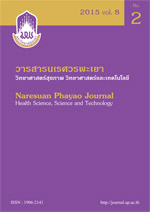ประสิทธิผลของน้ำหมักจาก Methylobacterium radiotolerans กลุ่มแยก ED5-9 ต่อการเพาะเลี้ยง แคลลัสของหญ้าปักกิ่ง
Keywords:
เมทิลโลแบคทีเรียม, เรดิโอโทเรอราน อีดี 5-9, แคลลัส, หญ้าปักกิ่ง, Methylobacterium radiotolerans, callus, Murdannia loriformis (Hassk.) R. Rao & KammathyAbstract
การศึกษามุ่งหมายกำหนดหาประสิทธิผลของน้ำหมักจาก Methylobacterium radiotolerans ED5-9 ต่อการเพาะเลี้ยงแคลลัสหญ้าปักกิ่ง โดยใช้กรดน้ำส้มอินโดล-3 ที่ความเข้มข้น 0.156, 0.312, 0.474 และ 0.632 มิลลิกรัมต่อลิตร หลัง 6 สัปดาห์ไม่พบความแตกต่างของการเจริญพัฒนาเป็นส่วนยอดและราก ส่วนยอดต่อชิ้นส่วนระหว่าง 1.8 ถึง 2.4 จำนวนรากต่อชิ้นระหว่าง 7.0 ถึง 8.5 ดังนั้นการเจริญพัฒนาของแคลลัสไม่สัมพันธ์กับความเข้มข้นของน้ำหมัก
Effect of fermentation broth from Methylobacterium radiotolerans isolate ED5-9 on callus cultureof Murdannia loriformis
Aphichat Chidburee1*, Thanawut Prombunchachai2, Nareeluk Nakaew2, Siripun Sarin2
1 Agricultural Technology Research Institute, Rajamangala University of Technology Lanna, Lampang Province 52000
2 Department of Microbiology and Parasitology, Faculty of Medical Science, Naresuan University, Phisanulok Province 65000
The study aimed to determine the effect of the fermentation broth from Methylobacterium radiotolerans ED5-9 on growth and development of callus culture of Murdannia loriformis (Hassk.) R. Rao & Kammathy. The concentrations of indole-3-acetic-acide (IAA) of 0.156, 0.312, 0.474, and 0.632 mg/L were used. After 6 weeks, there were no differences of shoot and root development. The numbers of shoot were 1.8 to 2.4 per explant, and the numbers of root were 7.0 to 8.5 per explant. Thus, the callus development did not relate to concentration of fermentation broth.
Downloads
Published
How to Cite
Issue
Section
License
ผู้นิพนธ์ต้องรับผิดชอบข้อความในบทนิพนธ์ของตน มหาวิทยาลัยพะเยาไม่จำเป็นต้องเห็นด้วยกับบทความที่ตีพิมพ์เสมอไป ผู้สนใจสามารถคัดลอก และนำไปใช้ได้ แต่จะต้องขออนุมัติเจ้าของ และได้รับการอนุมัติเป็นลายลักษณ์อักษรก่อน พร้อมกับมีการอ้างอิงและกล่าวคำขอบคุณให้ถูกต้องด้วย
The authors are themselves responsible for their contents. Signed articles may not always reflect the opinion of University of Phayao. The articles can be reproduced and reprinted, provided that permission is given by the authors and acknowledgement must be given.








